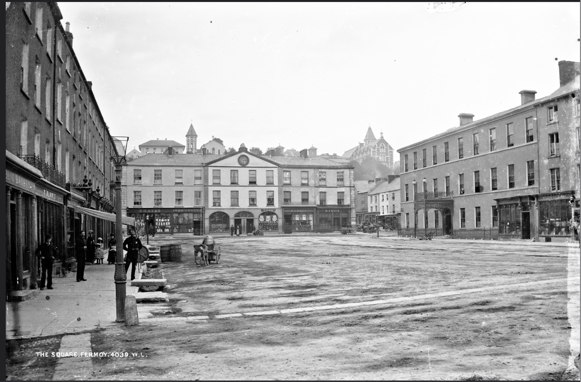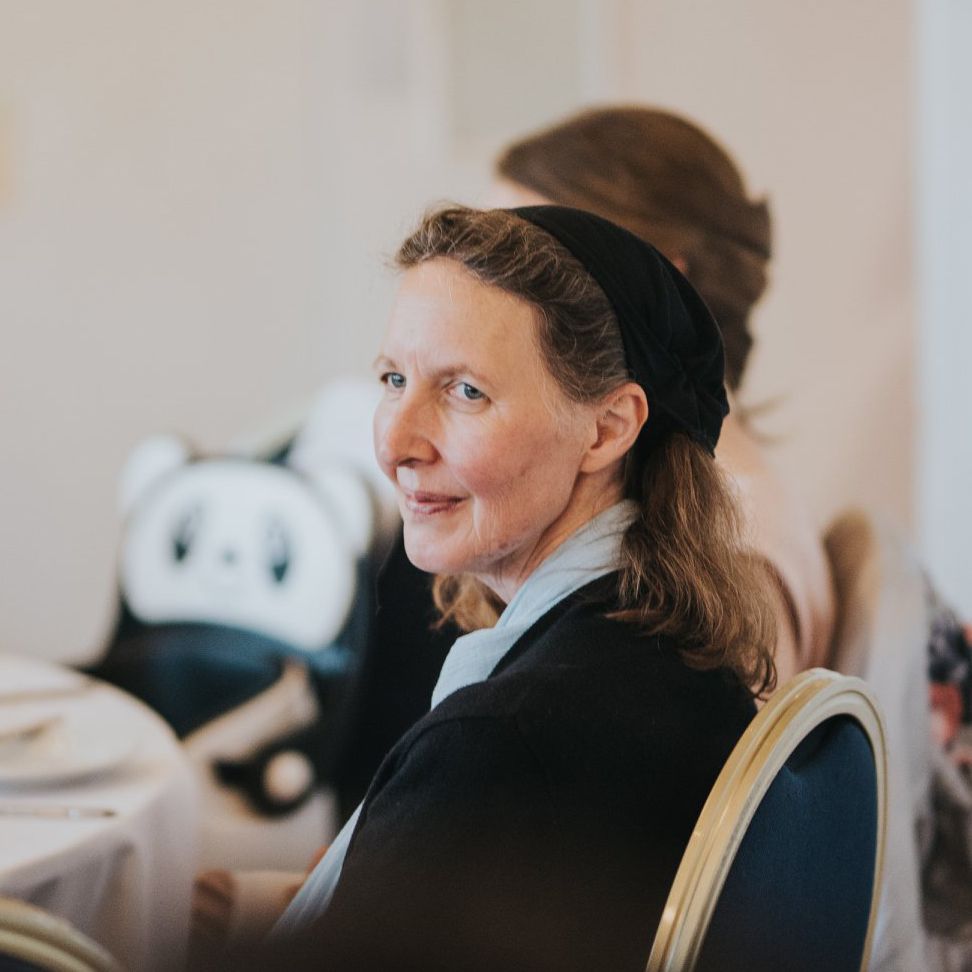Poppy at home in England
Poppy was heavily pregnant when CHTL was captured but had a few weeks to go according to the dates that her doctor had given her. She was due to go to a nursing home in London for the birth of her baby. Her Lucas in-laws on hearing of the kidnapping, decided not to tell Poppy but to just pack her off early to the nursing home. It must have been very confusing, and probably quite upsetting, to suddenly be banished to the nursing home with no clear explanation as to why she had to go ahead of time.
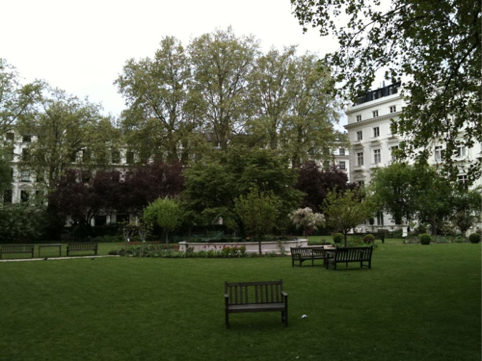
Being a country girl, Poppy was not over fond of being in London, but Cleveland Gardens was a grand residence overlooking a green leafy park. She would not have wanted for anything apart from her beloved ‘C'.
Poppy was still grieving for her mother and her childhood home. She had suffered the trauma of a bereavement and had moved home four or five times in the last year. Her life had been turned upside down: she had been torn out of her safe sheltered life in rural Devon, away from family and all those people she'd grown up amongst who'd loved her and cared for her.The uncertainty of her nomadic existence with the imminent arrival of a new life who would be entirely dependent on her; not knowing when she and CHTL could finally settle down together and raise their family; must have been intolerable. Yet the news she was about to discover would put all that into the shade.
The letters that CHTL wrote were sent to Poppy at CHTL’s parent’s new home, 'The Hall', in Welwyn and then redirected to her at 1 Cleveland Gardens, Hyde Park LONDON W2. She started receiving them a couple of days after she had found out about CHTL's capture. They must have been a huge comfort to her and gone some way to allaying her fears. She pencilled on each envelope a number corresponding to the order in which she received them. The first letter took five days to reach her.
27th June - First Letter after capture
Secret diary: Sun. Move when found out. Washing kit cards Whiskey etc.
Official diary (26th June): Kidnapped and removed under escort by Motor car to a farm at Mallow, County Cork East Riding where I stayed all day on Sunday 27th June.
Location: Pat Connell's home in Lackendarra, Lombardstown
Sun,
My darling Pip,
I expect you have heard by now that I have been taken prisoner. Well, old thing, you are not to worry. I am being well looked after and well treated, but very bored. I am afraid I shant be with you when the event takes place, but don’t worry as I really am all right. Don’t know when I shall see you again, but will come over directly I am let out to cheer you up. I hope I shall be able to write to you regularly.
your c
(The ‘event’ was the birth of their first child, Arthur William, known as Bill.)
First Letter sent to Mrs C.H. Tindall Lucas, The Hall, Welwyn, Herts England arriving on the 1st July 1920 but was redirected to 1 Cleveland Gardens, Hyde Park LONDON W2 postmarked WELWYN 2 July 1920
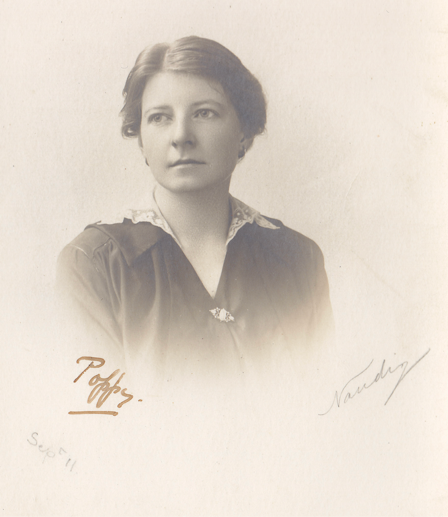
Poppy was in a very vulnerable state and in his first letter to her, CHTL sought at once to assure her that he was alright. However beginning his letter ‘My darling Pip’ must have set a few alarm bells ringing as he was rarely so openly and sincerely affectionate towards her in his letters: ‘My old Pip’ was his more usual address, which displayed affection but disguised it in teasing. Emotion was something CHTL kept bottled up but he had been shaken to the core by his near death experience the day before and even now he was unsure of what plans were being plotted as to his fate by his deadly serious captors. In contrast the one very telling phrase CHTL used, that would have reassured Poppy that he was alright in himself, was the old familiar line ‘but very bored’. Anyone who knew CHTL would recognise this as being a typical CHTL complaint and know that things couldn’t be too threatening if he had time to feel bored!
Of course, when CHTL wrote this letter, Poppy was totally unaware that her husband had been kidnapped. She'd been swiftly exiled to 1 Cleveland Gardens, Hyde Park - a London nursing home. By the time the letter had reached her, having been redirected to her in London, she had made the shocking discovery and little Cutlett had arrived in a rush as a consequence. The 'event' had happened and poor Poppy was struggling to recover from the shock of giving birth as well as the frightening news of her husband's incarceration. The timing couldn't have been worse!
The first place that CHTL was taken to was to Pat Connell's home in Lackendarra, Lombardstown, where he spent a night. It was said that the general was very subdued, after the shock of his failed escape attempt and Danford's shooting and appeared to be resigned to his fate. However CHTL was not one to throw in the towel so quickly and it is more likely that he was allowing his thoughts time to regroup: reassessing his situation, he began to plan his tactics for firstly survival and eventually for escape. He'd had plenty of experience of doing this during the Great War when he was in tight corners with his back against the wall and with far more lives than just his own to protect.
He was known for his ingenuity: General Shaw had written in his reference a couple of months earlier that CHTL was "full of resource and initiative''. He'd often been thrown in the deep end and had always managed to come out on top, even where others had failed. He was good at responding to situations, making the best of limited resources and a challenging environment.
CHTL had plenty of experience of trying to fulfil impossible orders to the best of his ability. Here was yet another challenge for him to tackle. He was determined to find a way through to freedom; empowered with the confidence of experience and previous victories, plus the added incentive to survive for Poppy's and Cutlett's sakes, he was not going to allow his present predicament to defeat him.
According to General Shaw, another of CHTL's strengths was that he was “most tactful in his dealing both with his subordinates & those over him'' and it was this tact that he began to use with great effect.
First Lieutenant (Cork II Brigade) Daniel McCarthy's house in Creggane was the next port of call:
When General Lucas (O/C British Forces at Fermoy) was taken prisoner by Brigade Officers at Kilbarry near Fermoy on June 27th, 1920, he was taken by his escort (Liam Lynch, Jerry Buckley and Jerry Hanlon) to Pat Connell's, Lackendarra, where he was detained for one night. [He] was then removed to my home at Creggane, where he was kept for another night before being taken to West Limerick on June 29th, 1920, by Seán Moylan and Paddy Clancy with some officers from West Limerick Brigade.
BUREAU OF MILITARY HISTORY, 1913-21. STATEMENT BY WITNESS. DOCUMENT NO. W.S.1,239 Witness Daniel McCarthy, Creggane, Lombardstown, Co. Cork. Identity. First Lieutenant Lombardetown Coy. Irish Volunteers, Mallow
Once installed CHTL set about combating his boredom by playing 'Patience' with a pack of cards, no doubt requested from his bemused keepers. He soon sent one of them (Michael O' Connell) off for the necessary bottle of whiskey:
I well remember that General Lucas was the first person I saw playing "Patience". While being held prisoner he asked for some alcoholic refreshments and gave me some money, with which I bought a bottle of whiskey for him.
BUREAU OF MILITARY HISTORY, 1913-21. STATEMENT BY WITNESS. DOCUMENT NO. W.S. 1428. Witness Michael O’Connell, Glentane, Lombardstown, Co. Cork. Identity. Quartermaster, Cork IV. Brigade, 1st Southern Division, I.R.A.
CHTL was now establishing his coping mechanisms and was content to sit back, quietly taking everything in, to see how the land lay. Being able to communicate with Poppy was a huge weight off his mind.
On the first day CHTL was handcuffed and blindfolded and walked for two miles. His army training meant that he was able to estimate distances and directions quite accurately. He noted in his secret diary that he was with five men and they had a rendezvous north of the river. His captors were totally unaware of this secret diary which was kept on a tiny scrap of paper. Considering that he was so closely guarded day and night one wonders when he managed to record what was happening to him and in his vicinity.
Slattery
The Brigadier General was not the only prisoner the Cork Brigade had at that time; also incarcerated was Mr Slattery, the railway official who had upset the Republicans by showing bias to the British. John O'Connell explained the situation:
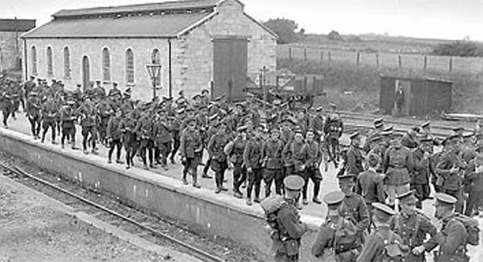
Towards the end of June 1920, the Station Master, Great Southern & Western Railway at Mallow was arrested by the local (Mallow) Company. His name was Slattery. At this time the railway workers were refusing to operate trains which carried British Military or stores. Slattery was alleged to be responsible for the selection of the men to be detailed for the operation of the trains and he appeared to be selecting married men to fill the jobs of those who had refused. In this way it was felt that he was trying to cause as much hardship as possible to the men who were standing by Ireland. In order to frighten him he was arrested by the, Mallow Company and taken (as it was described at the time) to ”an unknown destination”. He was, in fact, taken to my home. He arrived there with his escort about 1 a.m., I think, the date was 28th June, 1920. Sentries were posted, viz. Con Buckley and Con Breen.
Before the arrival of Slattery and his escort I was instructed by Denis Ryan - a Volunteer in the Lombardstown Company - to go for Con Buckley and to take him to my home. I went and collected Buckley and when we arrived back Slattery was at my house. He was accompanied by Mick McCarthy (Myles) and his brother (Dan). Con Buckley and Con Breen were then posted as sentries...
This was the position at 3 a.m. when Ned Murphy, Jerry Buckley, Jerry Hanlon and Liam Lynch arrived. They were escorting another prisoner who was none other than General Lucas, Officer Commanding the British garrison at Fermoy. He had been taken prisoner by Liam Lynch and some other Brigade officers in the vicinity of Fermoy on the previous evening.
BUREAU OF MILITARY HISTORY, 1913-21. STATEMENT BY WINTESS DOCUMENT NO. W.S. 1.211 Witness John O'Connell (Jack), Cloon, Castletownroche, Co. Cork. Identity. O/C. Lombardstown Coy. Mallow Batt’n., Cork II Brigade.
This posed a logistical problem for the Volunteers, how could they juggle two prisoners with their limited resources already at full stretch? In the end it was decided that Slattery being the least valuable prize should be moved and CHTL should be installed in his still warm bed!
When the party with General Lucas had ascertained how things stood, Liam Lynch, Me. 0/C, ordered the immediate removal of the prisoner Slattery to another place of detention. As a matter of fact, he stated that the prisoner (Slattery) should not have been taken over from the Mallow Company. General Lucas was now placed in the room vacated by Slattery and a strong guard was mounted. Great secrecy had necessarily to be maintained, and trustworthy men had to be selected for guard duty. Amongst the men engaged on this work were, as far as I can recollect, Dan O'Callaghan, Con Buckley, Con Breen, Dan McCarthy, Phil Singleton, Michael McCarthy and John O’Connell.
BUREAU OF MILITARY HISTORY, 1913-21. STATEMENT BY WITNESS. DOCUMENT NO. W.S. 1428. Witness Michael O’Connell, Glentane, Lombardstown, Co. Cork. Identity. Quartermaster, Cork IV. Brigade, 1st Southern Division, I.R.A.
Following the arrival of General Lucas, Slattery was removed to the home of Con Buckley. He was escorted by Con Breen, Con Buckley and myself (John O’Connell).
BUREAU OF MILITARY HISTORY, 1913-21. STATEMENT BY WINTESS DOCUMENT NO. W.S. 1.211 Witness John O'Connell (Jack), Cloon, Castletownroche, Co. Cork. Identity. O/C. Lombardstown Coy. Mallow Batt’n., Cork II Brigade.
Mr Slattery endured a mere two or three days in captivity. If he was aware of the near presence of the British general he was not going to dare to upset the Sinn Feiners further by disclosing the information to the RIC. He was probably very shaken by his ordeal and no doubt made sure that he 'toed the party line' in future.
Riots in Fermoy
According to Volunteer James Hackett:
On the night following the capture of Lucas, the enemy forces stationed in Fermoy proceeded to smash up the shops in the town. Practically every shop window was broken and some looting took place. All available members of the Fermoy Company were on duty in the town throughout the night, keeping guard on the premises which had been wrecked and endeavouring to prevent looting. The presence of the Volunteers undoubtedly saved the shopkeepers of Fermoy from much greater losses.
BUREAU OF MILITARY HISTORY, 1913-21. STATEMENT BY WITNESS. DOCUMENT NO. W.S. 1,080 Witness James Hackett
John O'Connell (Jack),remembered his brother Patrick who was a student at St. Colman’s College, Fermoy, returning home:
He was unaware of the presence of General Lucas in the home and he did know Liam Lynch who was sitting at the kitchen fire reading a book. My mother asked if he had any news and he said that the British Military were going to blow up Fermoy. Liam Lynch then had a short conversation with Patrick and then went into the room where General Lucas was detained. In a short time he returned with a dispatch written by General Lucas to 0/c., British Forces at Fermoy telling him to ensure that no reprisals were to take place.
Liam Lynch then sent for me and asked me to go to Fermoy with the dispatch. As I was preparing to go he changed his mind as he considered it undesirable to send a member of the household where General Lucas was a prisoner with the message. Mick McCarthy (Myles) was the guard on duty at the time and Liam Lynch instructed him to go to Fermoy with the dispatch. As far as I know Mick McCarthy travelled to Fermoy with instructions to leave the message at a certain house in Fermoy but when he got there the people of the house would not take the dispatch. I think that he eventually arranged for the delivery of the message to the British 0/C. by one of the priests in Fermoy. On the Monday night following the departure of the messenger for Fermoy, General Lucas was removed about 11 p.m. to Dan McCarthy’s, Creggane, and after three or four days there he was moved from Cork II. Brigade area to, I think, West Limerick.’'
BUREAU OF MILITARY HISTORY, 1913-21. STATEMENT BY WITNESS. DOCUMENT NO. W.S. 1,211 Witness John O’Connell
The Auckland Star, one of New Zealand’s leading newspapers of the day reported on the frantic search for the missing general and his troops’ reprisal:
CAPTURED GENERAL, RETALIATION BY TROOPS. FERMOY SHOPS LOOTED.
(By cable-Press Association-Copyright)
LONDON, June 29.
Military motorcars and aeroplanes are scouring the west and south of Ireland in search of Brigade-General Lucas who was kidnapped on Sunday by Sinn Feiners near Fermoy. Destroyers and patrol boats have been warned to examine all passing craft.
Soldiers have retaliated for the capture of General Lucas. Four hundred marched through the streets of Fermoy at midnight on Sunday. They smashed windows and looted shops, including jewellers’ establishments. Enormous damage was done. The residents were terrorised, and several shopkeepers were threatened by soldiers, who declared that unless General Lucas was released by Monday night “up would go the town”.Riots occurred at Lismore County Waterford, on Sunday night. The town was partially wrecked. Shops and houses were looted during bomb throwing and rifle firing – (A and NZ Cable)
Auckland Star, Volume LI, Issue 155, 30 June 1920, Page 5
The New York Times also reported on the rioting:
'Soldiers run riot in an Irish Town'
'Demolish shops in Fermoy in revenge for kidnapping of General Lucas.'
CORK, Ireland, June 28.- A serious sequel to the kidnapping of General Lucas occurred at Fermoy last night, when damage to the extent of many thousands of pounds was done in the town by troops who, it is alleged, definitely stated they were acting in this manner as retaliation for the kidnapping of the General.
A large number of troops gathered in Fermoy during the evening, and noisy scenes were witnessed until a late hour. At midnight the attitude of the soldiers crystallized in an attack upon various shops throughout the principal thoroughfares. Men broke out of barracks and ranged through the streets, smashing plate glass windows in every direction, and throwing the contents of shops into the roadway.
A jeweller’s shop was attacked and stripped of thousands of pounds worth of jewellery, which was thrown about the streets. Two motorcycles from a cycle shop were thrown into the river. The disturbances continued for two hours, during which in a single street thirtyfive shops were more or less destroyed, the splintering of windows being hailed with violent cheering.It is declared that shots were also fired.
At 2 o’clock the men voluntarily returned to barracks, and eventually a strong picket, fully armed and supported by police patrolled the town. A meeting of townspeople this afternoon made an appeal to General Strickland, commander of the southern area, to prevent a repetition of the outbreak.
In September last considerable damage was inflicted upon property in Fermoy, following the shooting of Private Jones, one of a party of soldiers who were held up on their way to church parade. The present occurrence has produced a condition of terror among the inhabitants.
New York Times June 28 1920
CHTL was furious with his troops for their ill-discipline and when he got the chance he told them so in no uncertain terms; reprimanding them for their “misplaced loyalty”.
Above the crash of breaking glass as shop windows were smashed in, the cockney accents of drunken soldiers rose in intermittent shouts:“We want our ____ General back” :“Give us back our ____ General”!
(Florence O’Donoghue No Other Law p79)
One of the reasons for CHTL being posted to Fermoy was to tighten up on army discipline and raise morale after a previous riot following the shooting of a British soldier in Fermoy in September 1919. Private Jones was attending a church service with a group of soldiers when the IRA tried to seize their weapons. The British soldiers, outraged that one of their men should be killed when he was peacefully fulfilling his religious duty, retaliated by smashing up the town.
As had been seen in Luton and other English cities and towns, rioting was not an unusual occurrence in the post war years, especially amongst military or ex military men. The brutality of what they had been through during the Great War and their frustration at not coming home to the life they had dreamt of, meant that discontentment was always in danger of exploding into violence. The riots in Fermoy would not have been entirely a response to the kidnapping of their much liked general, but more an excuse to kick back at their present way of living - once again far from family and a settled and happy home-life. There were no jobs in Britain and for many continuing in the army was not so much their choice as a financial necessity.
Ironically the IRA had captured the one person who could have prevented the rioting. CHTL would never have allowed such anarchy to have broken out on his watch!
